From lie-flat to La-Z-Boy: What happened when an airline gave me a different aircraft — and a new route home
When my 81-year-old uncle told me he wanted to visit South Africa and take his first safari, I knew I'd have to fly us (more so him) comfortably.
Luckily, I had a stash of points just waiting for an opportunity like this one. The beginning of the trip went off without a hitch, but the way home had me asking myself: Can airlines change your aircraft, your seat and your route without repercussion? What rights do passengers have if airlines do these things? Are you entitled to compensation?
I'll be exploring that and more below, but first, the story of why I found myself asking these questions in the first place, after Ethiopian Airlines changed my aircraft and also my way home, sending me briefly to Egypt.
How I booked my trip
I used up my collection of Iberia Avios to fly us with British Airways in business class from Madrid (MAD) to Johannesburg (JNB) via London (LHR) on the way down.
For our return, I searched on United.com for availability and used United miles to fly on Star Alliance partner Ethiopian from Cape Town (CPT) to Madrid with a stop in Addis Ababa (ADD).
I searched for two tickets, of course, but found that there was only one ticket available with business class in both segments. So, I booked my uncle on that ticket with 57,500 miles, and found a mixed-cabin itinerary for myself, also for 57,500 miles, with the CPT-ADD segment in economy on the Boeing 777-300ER and the ADD-MAD segment in business on the Boeing 787.
The journey
After a long but uneventful flight in economy from Cape Town to Addis Ababa, I headed to the lounge about 20 minutes before boarding.

Then I headed over to a special gate, as business class boarded through a separate area. Here, priority passengers took an elevator down to a bus to head to the plane. I didn't see the plane until the bus pulled up to it — a detail that turned out to be very important.
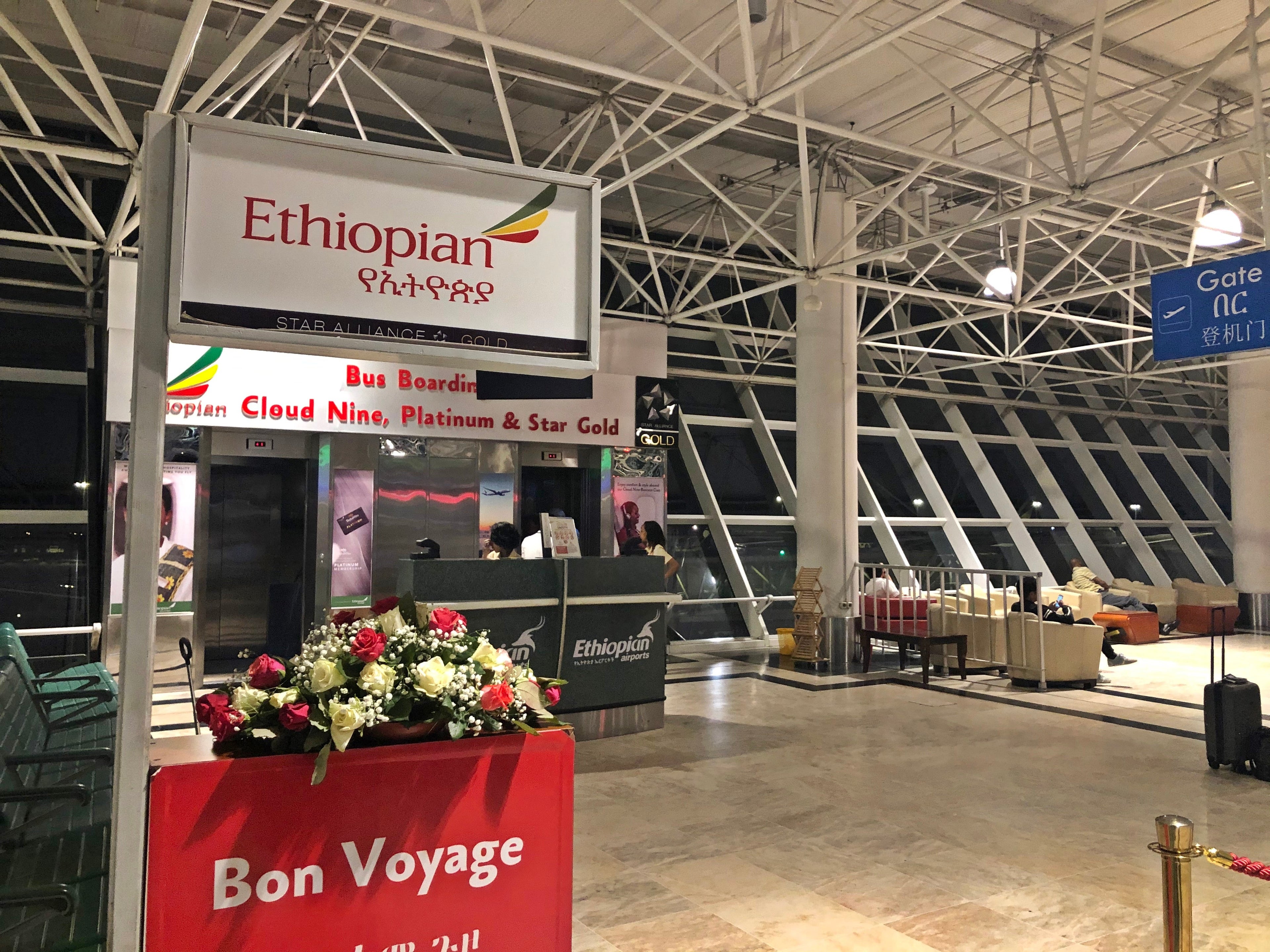
When I got off the bus, I knew something wasn't right. It was pretty dark outside, but I knew that the aircraft was too small to be a 787 right as we pulled up.

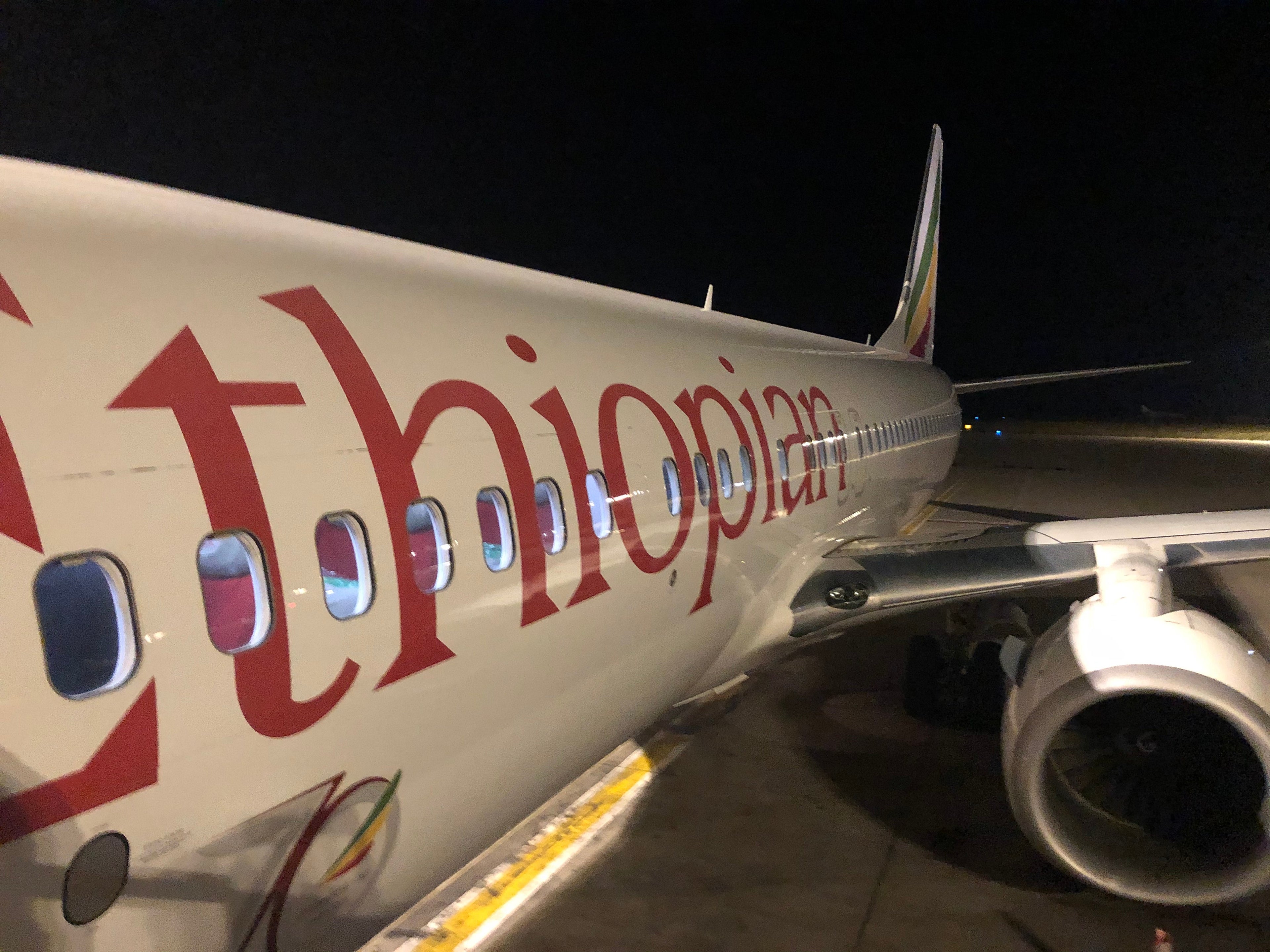
I boarded anyway (there wasn't much I could do) to find a tired-looking business-class section with dated recliner seats.
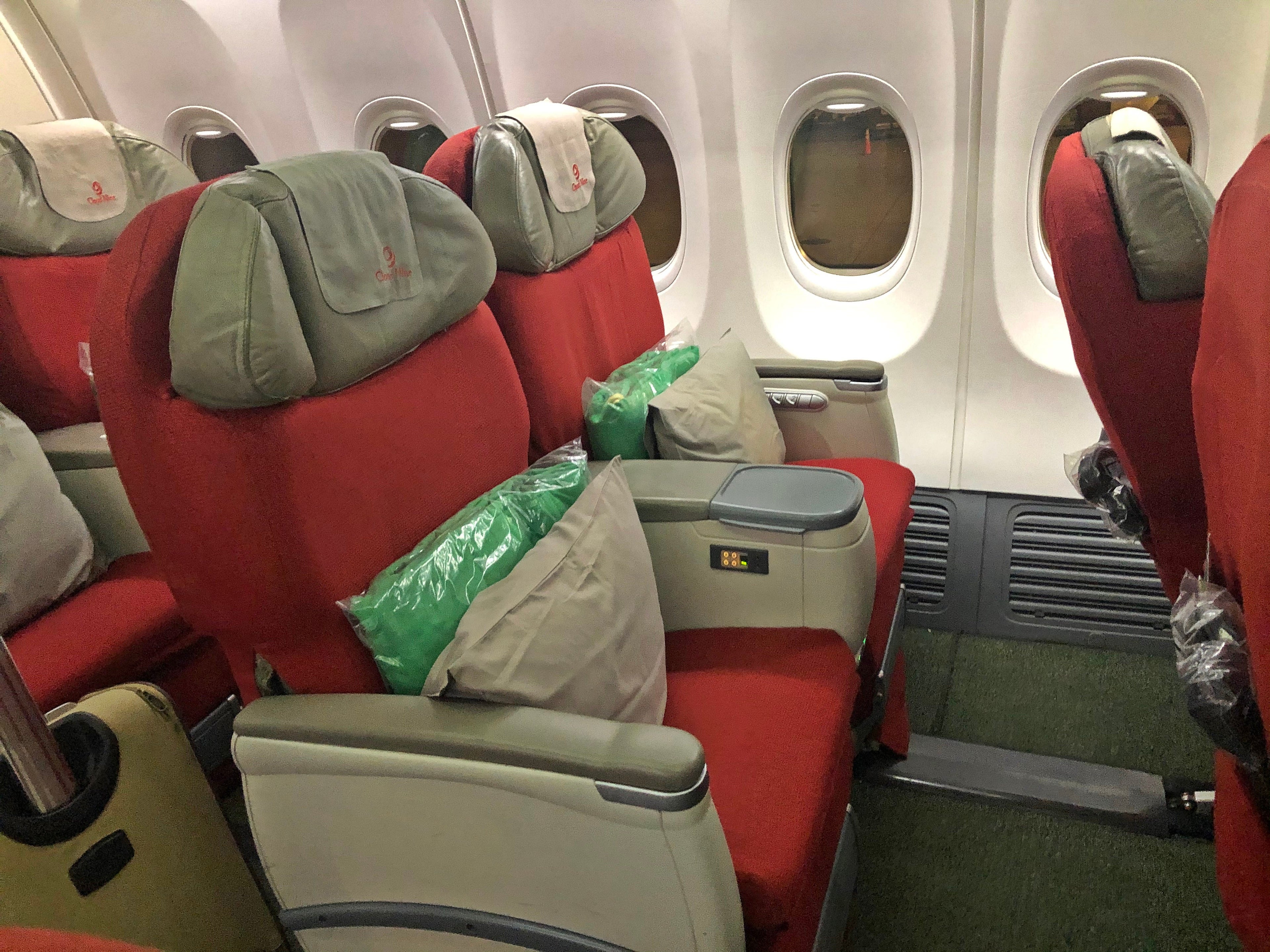
I immediately asked the flight attendants what was going on — and no one, of course, knew anything. I was told that they were just as surprised as we were to be on a different aircraft.
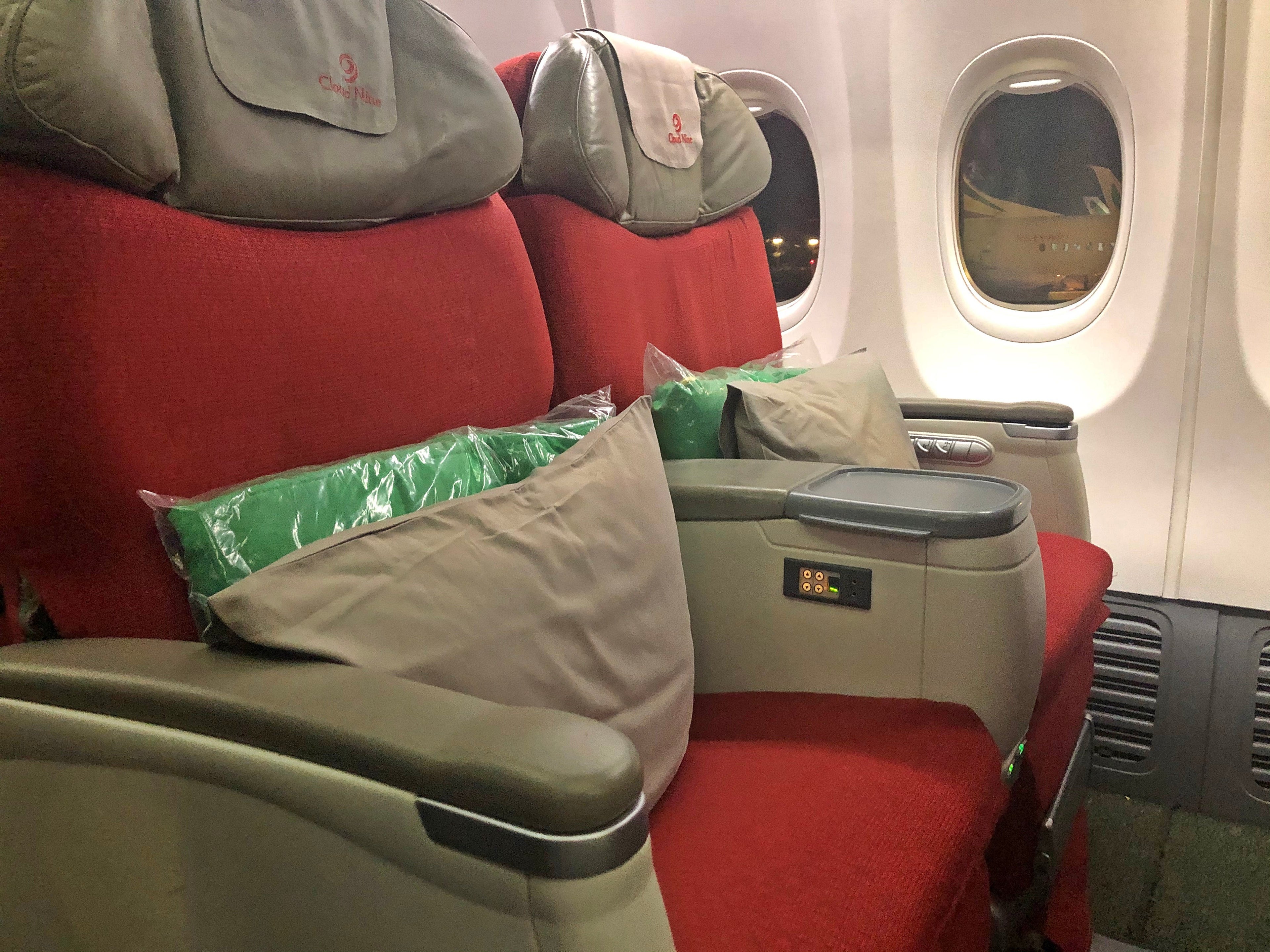
I sat in my lumpy recliner, the kind you'd sit in at your great-aunt's house, feeling every spring poking into you. I knew I wouldn't get much sleep on this flight.
For comparison, below, I've included a shot of Ethiopian's business class seat on the 787, the plane I was supposed to be on.
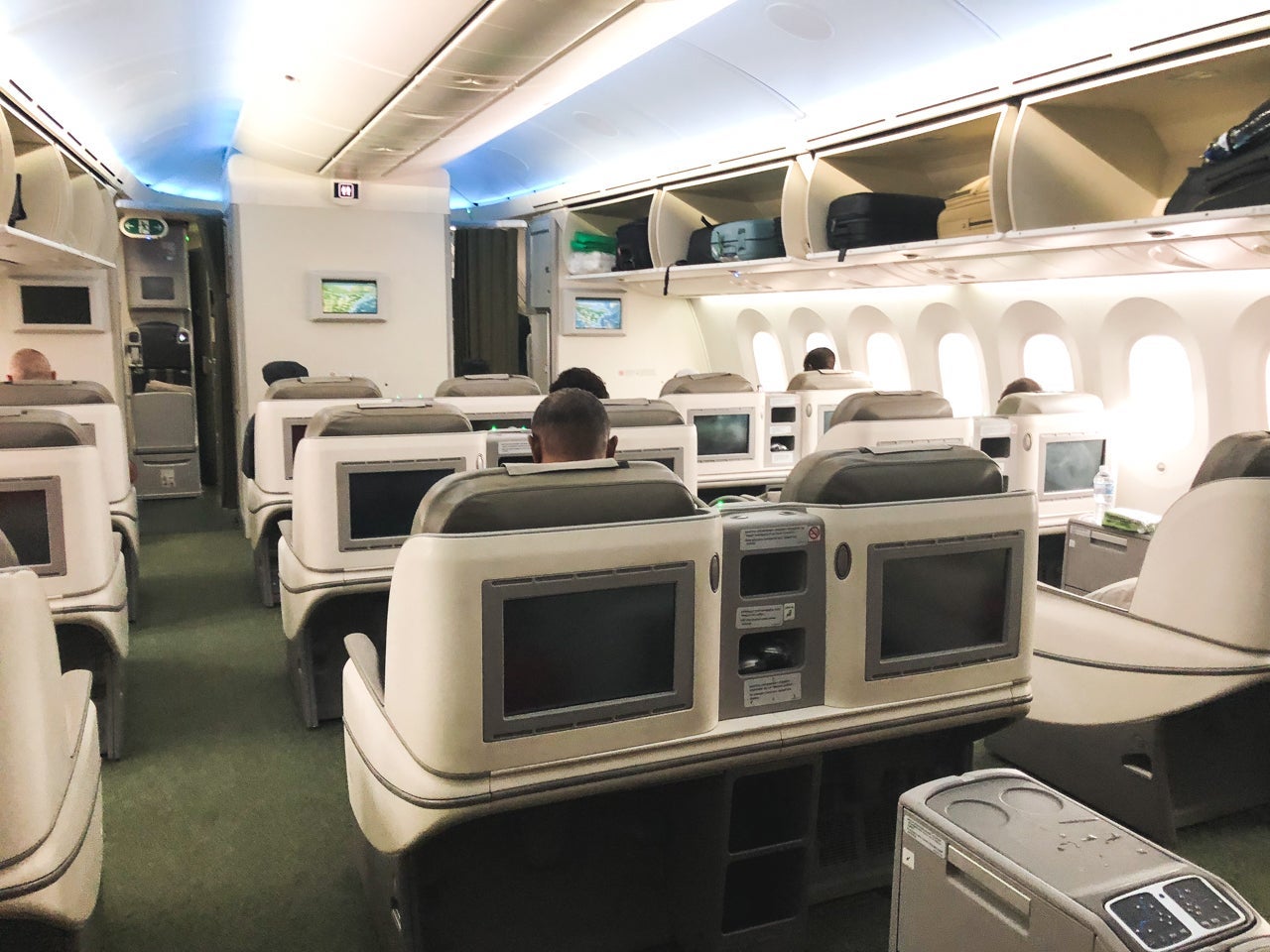
But back to the 737. The business-class section had four rows of seats, a 2-2 configuration, each with a pillow and a blanket. It wasn't full, so no one was next to me. There weren't any in-flight entertainment screens on the back of the seat, but I did find a universal power outlet at the bottom of the seat (no USB).
The FAs were very apologetic but still couldn't explain why there was a plane swap and, more importantly, why no passengers were notified ahead of time, even during boarding or at the gate. I eagerly accepted a preflight glass of Champagne to dull the annoyance.

We took off, and about 20 minutes later, the pilot came on. He gave no reason for the aircraft switch but said we were bound for Cairo, not Madrid. A collective gasp went through the plane. Egypt? Surely, I had boarded the wrong flight. Maybe we all did?
But then the pilot continued, and explained the stop would be to refuel, as the 737 couldn't make it to Madrid nonstop. Later, he came back on and said the flying time to Cairo would be about three hours.
I knew the situation wasn't the fault of the FAs, and they were actually very friendly and apologetic throughout the flight. But, with no prior communication letting me know of this change, I didn't have time to notify anyone back home and reschedule appointments. And the plane was not equipped with Wi-Fi.
What really upset me, though, was every time I noticed my uncle (who is in great shape for his age, but still) fidgeting around trying to find a comfortable position to sleep. I had promised him an easy, relaxed trip in a lie-flat seat, and that was clearly not happening.
But there was nothing I could do. I sat back, listening to the other passengers complain and yell at the FAs about the change and delay and resigned myself to just try to enjoy the flight.
I was served a forgettable meal about 30 minutes into the flight, and after picking at that, I decided to try to get as comfortable as I could in the not-so-comfy seat because we'd be landing in Cairo soon and I would likely be jolted out of sleep anyway. And, at this point, I was still unsure whether or not I'd have to disembark the aircraft. Luckily I always come prepared with a Netflix series downloaded on my phone and an external battery.
Upon landing in Cairo, we taxied, stopped, and all the lights flipped on, and things became chaotic: People were getting up, and even the FAs didn't know what was really happening. Then we were told to stay seated with our seat belts on as the aircraft was refueled and to turn all electronics off — which no one did.
About an hour and a half after landing, we took off again for Madrid, and this time my uncle and I tried to get some sleep, to no avail. There was no second meal served.
We finally landed in Madrid at 7:30 a.m., two hours and five minutes after our scheduled landing time of 5:25 a.m., which actually wasn't too bad of a delay. However, I was exhausted, as I hadn't slept much, and had to rush home and head to meetings — I'd planned a full day thinking I would have had an uneventful, full night of sleep on a nonstop flight in a nice (enough) lie-flat bed.
I've traveled extensively and can still function relatively OK on such little sleep, but the situation is much different for an 81-year-old person, despite his being in great shape.
Wait, can airlines do this?
The situation bothered me for a number of reasons. The apparent bait-and-switch situation left me feeling annoyed and cheated. I'd paid for one product, but received another — a much inferior one. The route was changed, leaving me with two flights on a routing that prevented any meaningful sleep.
Though I completely understand that things happen, I was never properly informed of this change. Passengers weren't notified that the plane was making a stop in a different country until we were airborne. On a more personal level, I felt bad that my uncle couldn't rest well or get comfortable. I can deal with a night of discomfort, but I was disappointed that I had reassured him he would have a comfortable flying experience and it wasn't at all what he received.
This all got me thinking: Are airlines actually allowed to do this?
Well, when you buy an airline ticket, you are technically agreeing to a contract of carriage — even though most passengers probably don't read this before purchasing. Each airline has its own contract, and, unfortunately, the news isn't great for passengers.
As a passenger, it's difficult to determine which contract applies to your specific flight, especially when you use miles from one airline to book flights with another partner airline. And, since this is exactly what happened to me, I looked up both United's and Ethiopian's contracts of carriage -- and found them to be anything but helpful. Long story short, airlines have very limited liability when it comes to situations like these.
What can you do if this happens?
Unfortunately, there is little to be done at the moment the unexpected change happens but accept it and try to stay positive. Once I realized the FAs had just as little information as I did, I stopped peppering them with questions. They were trying really hard to please, and I felt bad they were dealing with so many angry passengers — and none of this was their fault. The service was the only good thing about the flight.
However, one thing you can do is be prepared. Bring backup snacks, entertainment and a neck pillow, even when you think you'll be fed and have personal screens and a lie-flat bed. You never know when —surprise! — you'll suddenly be heading to Egypt or be stuck on the plane much longer than intended.
Based on all of the previous information, I decided to complain to both of the airlines. Even though, according to the contract of carriage, I waive many of my rights as a passenger, I still wanted both airlines to know how disappointed I was, at least with the lack of communication.
And, according to the bolded section above via Ethiopian, I was supposed to have been notified of the changes via a number of different channels, like at the boarding gate or via phone or email, and I most certainly wasn't.
In my case, I wasn't eligible for protection from the EU261 rule, because my flight was entering the EU on a non-European airline. But, if you find yourself in a similar situation and you're flying on a European carrier to or from the EU, the rules and regulations would apply.
After I got home, I emailed Ethiopian and United, asking that they address the situation and provide adequate compensation. I also called both airlines, leaving a voicemail for United customer service.
I did speak to representative at Ethiopian, who told me all support and customer feedback queries are directed through email and she couldn't help me.
How the airlines responded
About seven days later, I received a response from United, offering both my uncle and me sincere apologies and a $500 voucher to use on United.com. While some may think this was not enough compensation and others too much, I was happy to have gotten a response which addressed the fact that the situation was not okay. And, of course, I was pleased with the compensation as a gesture of goodwill.
A few days later, I received an email from Ethiopian:
"At the outset we would like to apologize for all the inconveniences that you may have encountered due to the reported matter. At Ethiopian Airlines, we strive to ensure that all of our customers are treated and we take pride in ensuring our customer's satisfaction and they deserve the best when they fly with Ethiopian Airlines. We also understand that passengers book in business class for a better service and comfort. Therefore, we always try to make sure that we perform in-line with our preset aircraft schedules. But, rarely unforeseen circumstances like operational reason prevent us to fulfilling our promise. In your case there is no any delay or cancellation or diversion of flight it was aircraft change and Per our service recovery we don't have compensation scheme for aircraft change. I hope you don't give up on us as we are continuing our effort for a better service."
If Ethiopian didn't want to provide me with any compensation, there was nothing more I could do. But, I was very annoyed at the fact that the email response directly stated that there was no delay or diversion of the flight. If an unexpected trip to Egypt isn't a diversion, I'm not quite sure what is. And while the delay of just over two hours wasn't massive, it still was a delayed arrival.In the end, I was surprised and pleased that United took some responsibility for the situation, though I felt that the blame should have actually fallen more on Ethiopian. I still feel like Ethiopian should have assumed a little more responsibility, even if they weren't going to provide any compensation.
Bottom line
You're largely at the mercy of the airlines when it comes to unexpected changes to your flight, and their contracts of carriage won't necessarily protect you. Always go to the airport equipped with a positive attitude, entertainment and even food and snacks for unforeseen flight changes and patience to wait out a response from the airline in case things go wrong.
If you are in a situation where you paid for a flight on one airline and it was operated by another, terms and conditions get even more confusing. Some airlines may not take responsibility (Ethiopian in my case) while others may offer compensation (United in my case). It's always worth contacting both airlines, even if you're not exactly sure which airline is really at fault or should assume the responsibility.
If nothing else, this serves as a good reminder to keep all documentation of your flight like boarding passes, e-tickets, itineraries and any communication you receive from the airline, so that you can prove your case once you are eventually able to get a hold of the airline(s).
Update 12/13/2019: Four weeks after this situation occurred (about 10 days after this story published), Ethiopian contacted me saying my case was undergoing additional review. About another week later, I received an email from Ethiopian apologizing for the situation, recognizing the inconvenience caused and offering my uncle and me a $200 voucher for each of us to use on future Ethiopian purchases.
TPG featured card
at American Express's secure site
Terms & restrictions apply. See rates & fees.
| 4X | Earn 4X Membership Rewards® points per dollar spent on purchases at restaurants worldwide, on up to $50,000 in purchases per calendar year, then 1X points for the rest of the year. |
| 4X | Earn 4X Membership Rewards® points per dollar spent at US supermarkets, on up to $25,000 in purchases per calendar year, then 1X points for the rest of the year. |
| 3X | Earn 3X Membership Rewards® points per dollar spent on flights booked directly with airlines or on AmexTravel.com. |
| 2X | Earn 2X Membership Rewards® points per dollar spent on prepaid hotels and other eligible purchases booked on AmexTravel.com. |
| 1X | Earn 1X Membership Rewards® point per dollar spent on all other eligible purchases. |
Pros
- 4 points per dollar spent on dining at restaurants worldwide and U.S. supermarkets (on the first $50,000 in purchases per calendar year; then 1 point per dollar spent thereafter and $25,000 in purchases per calendar year; then 1 point per dollar spent thereafter, respectively)
- 3 points per dollar spent on flights booked directly with the airline or with amextravel.com
- Packed with credits foodies will enjoy
- Solid welcome bonus
Cons
- Not as useful for those living outside the U.S.
- Some may have trouble using Uber and other dining credits
- You may be eligible for as high as 100,000 Membership Rewards® Points after you spend $6,000 in eligible purchases on your new Card in your first 6 months of Card Membership. Welcome offers vary and you may not be eligible for an offer. Apply to know if you’re approved and find out your exact welcome offer amount – all with no credit score impact. If you’re approved and choose to accept the Card, your score may be impacted.
- Earn 4X Membership Rewards® points per dollar spent on purchases at restaurants worldwide, on up to $50,000 in purchases per calendar year, then 1X points for the rest of the year.
- Earn 4X Membership Rewards® points per dollar spent at US supermarkets, on up to $25,000 in purchases per calendar year, then 1X points for the rest of the year.
- Earn 3X Membership Rewards® points per dollar spent on flights booked directly with airlines or on AmexTravel.com.
- Earn 2X Membership Rewards® points per dollar spent on prepaid hotels and other eligible purchases booked on AmexTravel.com.
- Earn 1X Membership Rewards® point per dollar spent on all other eligible purchases.
- $120 Uber Cash on Gold: Add your Gold Card to your Uber account and get $10 in Uber Cash each month to use on orders and rides in the U.S. when you select an American Express Card for your transaction. That’s up to $120 Uber Cash annually. Plus, after using your Uber Cash, use your Card to earn 4X Membership Rewards® points for Uber Eats purchases made with restaurants or U.S. supermarkets. Point caps and terms apply.
- $84 Dunkin' Credit: With the $84 Dunkin' Credit, you can earn up to $7 in monthly statement credits after you enroll and pay with the American Express® Gold Card at U.S. Dunkin' locations. Enrollment is required to receive this benefit.
- $100 Resy Credit: Get up to $100 in statement credits each calendar year after you pay with the American Express® Gold Card to dine at U.S. Resy restaurants or make other eligible Resy purchases. That's up to $50 in statement credits semi-annually. Enrollment required.
- $120 Dining Credit: Satisfy your cravings, sweet or savory, with the $120 Dining Credit. Earn up to $10 in statement credits monthly when you pay with the American Express® Gold Card at Grubhub, The Cheesecake Factory, Goldbelly, Wine.com, and Five Guys. Enrollment required.
- Explore over 1,000 upscale hotels worldwide with The Hotel Collection and receive a $100 credit towards eligible charges* with every booking of two nights or more through AmexTravel.com. *Eligible charges vary by property.
- No Foreign Transaction Fees.
- Annual Fee is $325.
- Terms Apply.


